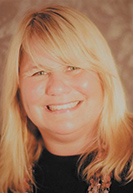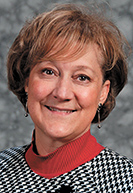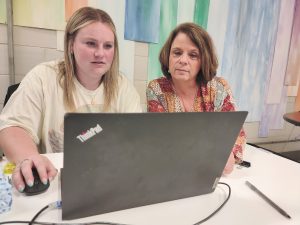Subscriber Benefit
As a subscriber you can listen to articles at work, in the car, or while you work out. Subscribe NowStenciled on the back wall of the Expungement Help Desk run by the Neighborhood Christian Legal Clinic is a reminder that many who come looking to move forward with their lives often photograph and post on their Facebook pages.
The message reads: “Don’t look back, you’re not going that way.”
As it begins another search for a new executive director almost two years after hiring its previous leader, Amy Horton, the clinic may need to keep that affirmation in mind.
The faith-based legal aid provider, like legal service nonprofits across Indiana, has had to figure out how to meet the overwhelming need created by the COVID-19 pandemic while not being able to meet face-to-face with clients. But the clinic has had the additional challenges of recruiting and hiring remotely because of significant turnover in employees, making internal structural changes and bolstering its fundraising efforts.
Now, the nonprofit is preparing to reopen. It has set April 18 as the date when employees will start working in person, and it is evaluating how to again meet people seeking help at the intake sites located around Indianapolis.

The interim executive director, Elizabeth Fiscus, who joined the clinic in April 2021, is focused on looking ahead.
Fiscus is meeting with the clinic’s longtime community partners and having conversations. The goal is to meet clients where they are by finding out how the neighborhoods are doing and how legal services can help.
“At this point, we’re investigating as we rebuild, because the world’s changed since it shut down,” Fiscus said. “So we want to build things right and we want to build it based on need. So we’re going to start reaching out, investigating the needs, taking that information back and analyzing it and see how we can form those ties and what we can do for them to best serve their needs in a quality manner.”
Also, the clinic’s board of directors has formed a search committee and hired Charitable Advisors to find the next leader of the organization. Employees and former employees interviewed for this story praised Horton and the leadership she provided during a particularly difficult time.
Horton arrived at the clinic in April 2020 and left in February. She said she loved the clinic and its mission, but she had to step away to care for her health and her family.
Board vice-chair Jacqueline Pimentel-Gannon noted the position does not require the executive director to have a law degree, but the clinic wants someone with leadership skills, management experience and “a real heart” for legal aid work.
“The key thing that we would be looking for (is) someone interested in supporting and leading and kind of being all-in with the mission the clinic has,” Pimentel-Gannon said. The next leader having “that passion for the legal and the people we serve, I think, is something that’s really important to us.”
Anchored in faith
The clinic was founded in 1994 as a faith-based legal aid provider which, according to its first executive director Abby Kuzma, makes the organization unique among other legal aid providers.
Those who work for the organization, Kuzma said, tend to have a strong commitment and see the job as a way to live their faith. In addition, the clinic has intake sites embedded in different neighborhoods so individuals do not have to find their way to the main office, and it has offered services to meet the changing needs.

“Our goal was always to identify populations who are not being served and go there,” Kuzma said. The clinic wants to be “responsive to the felt needs of our clients and the low-income communities that are surrounding us,” she said.
The connection to faith is what attracted Fiscus to the clinic. As a “very strong Christian” and survivor of domestic violence, she said she has a passion for helping disenfranchised people through “the loving grace of Christ.”
Even for those who are not accepted as clients, the clinic still offers what help it can. Fiscus explained the organization’s mission includes providing preventative legal education by teaching individuals about their basic rights and how they can help themselves. Also, at the intake sites, everyone who came in previously was able to talk to an attorney and at least get a little information to better understand their own situations.
Fiscus said she believes the two areas where the clinic will have to focus are housing and immigration. Homeowners and tenants will continue to seek help with their housing issues, and immigrants will need assistance with a myriad of issues. Also, she emphasized, the clinic will have to listen.
“We need to reach out and see what our neighbors are saying they need from us,” Fiscus said. “… We have a lot of ideas that we want to take to them and see if it’s good for them. And we want to hear their ideas.”
Horton said the faith-based mission of the clinic helped in recruiting attorneys and staff to fill vacancies created by turnover. The clinic now has directors for its housing, immigration, survivor justice, tax and reentry programs.

Supporting the employees is the clinic’s first human resources director. Job descriptions have been rewritten to reflect what people are actually doing, salaries have been adjusted to keep them competitive and health insurance is now being offered. Also, managers are taking part in training and professional development.
According to its financial report filed in June 2021, the clinic has $2.72 million in net assets compared to $1.60 million in 2020. Horton brought on staff to build relationships in the community and boost donations. Also, a new Young Professionals Advisory Board has been installed to help promote the clinic and raise funds.
Horton said she sees the clinic as being in a position of strength and as continuing to benefit from its church foundation.
“I think many in the faith community are passionate about Biblical justice,” Horton said. “… I don’t see the faith-based community moving away from supporting the clinic.”
Showing kindness
The Expungement Help Desk is an example of the clinic’s faith in action.
Located in the subbasement of the City-County Building in downtown Indianapolis, individuals wanting to overcome their past mistakes have to do a bit of hunting to find the help desk. But once they arrive at the brightly lit room, they are greeted by a team of paralegals who explain the expungement process, search the court docket for criminal convictions and draft the petitions.
With the help of a five-year $1 million grant from the Lilly Endowment — the largest in the clinic’s history, according to Horton — the desk is expanding to offer follow-up services. The staff will check to make sure the individuals filed their petitions and will help respond to any questions the prosecutor may have.
In 2021, the help desk worked with 1,675 individuals and drafted 2,044 petitions. Julie Mennel, senior managing paralegal at the help desk, said during her eight years working on expungements, her perception has changed. Before, she acknowledged, she would have been leery of someone with a criminal record, but she has learned that poverty and a lack of positive role models can put people on a downward trajectory.
Helping people look ahead allows Mennel to practice her religious beliefs.
“I see the important opportunity,” she said, “to show kindness to people who have not been shown kindness before.”•
Please enable JavaScript to view this content.
